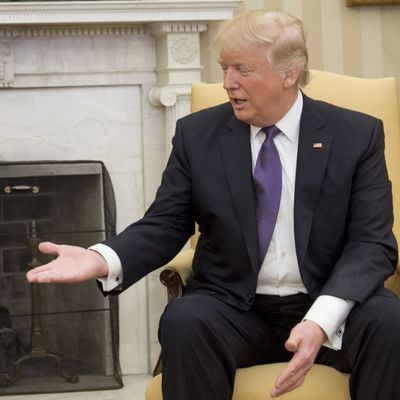
Remember when we were all worried about North Korea, but Wall Street was confident that the Trump administration wouldn’t do anything to slow down a booming Wall Street, bubbling manufacturing, and growing economy? Even as the administration has pursued its bumpy romance with Pyongyang, economic conflict is steadily ramping up with our closest allies.
In just the last week, the president has threatened Mexico and Canada again, suggesting he would walk away from NAFTA and negotiate individual deals with each country. In a phone call, Canadian prime minister Justin Trudeau tried to press Trump on how cars assembled in Canada could pose a national security threat to the U.S., Trump responded by needling Trudeau about that time in 1812 when “Canada invaded the U.S.” Except that it wasn’t Canada, it was Britain; it wasn’t 1812, it was 1814; and they didn’t drive across the border in cars … because the gasoline internal-combustion engine hadn’t been invented yet.
Meanwhile in Europe, French president Emmanuel Macron also had a phone call with Trump in recent days. Apparently it did not go well. He didn’t leak the contents, but when asked, he compared calls with Trump to sausages — better not to think about what’s inside.
Last weekend, French and German leaders laid out competing visions of what European leadership should look like in response to what Macron called a move toward “crude hegemony” on the part of the U.S. French leaders have implied that Americans are crude … but to actually say so? Mon dieu. The more moderate of the two is Germany’s Angela Merkel, who says that Europe must take its future in its own hands and be a serious leader in international affairs – without the U.S.
Ironically, the Group of 7 summit that Trump is attending in Quebec on Friday has its origins in a time of great hostility among the industrialized powers — and in a similar Franco-German desire to respond to international turmoil. In 1975, the world was buffeted by a dramatic rise in oil prices — engineered by OPEC to retake power from Western petroleum companies and their home countries. This came on top of political and economic strife that had been building for years around the Vietnam War, Richard Nixon’s 1974 resignation, and stagnation and economic decline in the United States. The six leaders who joined President Gerald Ford at the first summit directed much blame at the U.S. — and Ford personally — for the economic difficulties, inflation, and insecurity their own countries were already facing. They saw Washington as having initiated, inflated, and prolonged the Vietnam War while failing to manage its own budget and politics successfully. Oh, and the streets of several G7 countries were full of not just angry student protesters but violent terrorist groups targeting political leaders.
The histories of that time reveal a great deal of angst and backstage sniping among U.S. and foreign leaders. Fears about communal violence, and threats to the democratic order, seemed much more immediate then than they do to most observers now.
But even against that backdrop, none of the other members of the Group of 7 thought it would be productive, or politically useful, to confront Washington publicly. It speaks volumes, then, about how those six countries perceive the Trump administration, that they met separately to issue a pre-statement before Friday’s summit to express their extreme concern with U.S. policies – something which has never happened in the 43-year history of the group.
It’s never happened to the U.S. in any other forum, either.
Macron warned separately that a “G6 plus 1” outcome, with the U.S. left publicly isolated at the end of the meeting, was also possible. The last time the group isolated a member, it was Russia — after its invasion of Crimea.
So to summarize: Our closest allies — and six of the world’s ten largest economies — see this administration as a bigger problem than an oil shock and stagflation, and almost as big a problem as Russia invading Ukraine. They’re not “snowflakes” or hippie liberals. Well, maybe Justin Trudeau is a hippie liberal. But they’re deathly worried about what Washington’s choices are going to do to the stability of their economies.
Should we be worried too? Perhaps, you think, this is all just a bunch of diplomacy, and life can go on as scheduled. Wall Street disagrees. Corporate forecasters for the first time began lowering growth forecasts based on the possibility of economic disruptions coming from Trump’s conflictual approach to economic policy.
And this gets real for America very quickly when you look at the retaliatory tariffs announced by Europe, Canada, and Mexico. The countries paid special attention to products made or companies headquartered in the districts of GOP congressional leaders—targeting bourbon from Kentucky, motorcycles from Wisconsin, motorboats from Florida. But they will hit broadly, penalizing everything from pork, dairy, wheat, and rice to U.S.-made makeup and specialized steel.
We are now far beyond the trade deals Americans fought over in recent years. Something far more fundamental is at stake – the daily functioning of industry and consumption in what is still, by some measures, the world’s largest economy.





























